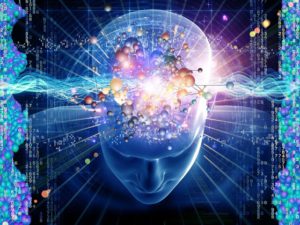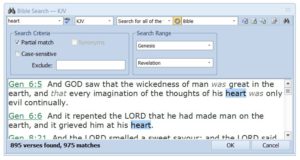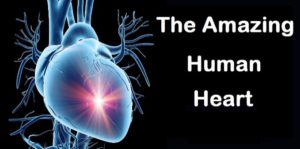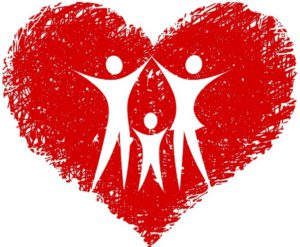The Brain Myth: Your Consciousness and Thoughts Originate in Your Heart, Not Your Brain (1)
“Why are you thinking these thoughts in your hearts? The thoughts that come out of the mouth come from the heart.” – words of Jesus Christ recorded in the Bible.
Those of us who have been educated in Western Culture today have been taught to believe that the center of a person’s consciousness and thoughts is our brain.

Like a computer that contains a microprocessor, which allows it to accomplish all of its various tasks, the idea that a human being also works like a computer with a brain that functions like a microprocessor, is something that almost all people raised in Western Culture assume is a fact.
But it is not a fact. It is a belief system.
And as a belief system, would it surprise you to learn that this is a fairly modern belief, and that historically it has not been the brain that has been considered the driving force in humans that allows them to think and reason, but it has been the heart that is attributed to human consciousness, including our intellect, speech, and thoughts?
When we look at the ancient literature written in non-Western cultures, the idea that the brain controls human thought and consciousness is mostly absent.
The largest collection of writings of antiquity that exist to us today is contained in the Bible, a collection of unique writings spanning over thousands of years.
Most of the Bible was written in Hebrew and Greek, and the most common translations of the Bible found today are English translations.
I have an electronic Bible I use every day (e-Sword), and in this program I currently have about 16 different English translations of the Bible.
I searched every English translation I have for the word “brain,” and all of them turned up a result with ZERO instances of the English word “brain” used to translate any of the words in the original languages.

If one does a search for the word “heart,” however, it will return a result of almost 1000 matches where words in the original languages were translated into English as “heart.”

While this simple exercise in searching for English words used to translate the Bible doesn’t prove anything (it is an argument from silence), it is strong evidence that the ancient cultures did not regard the human brain as all that significant as compared to the importance of our heart.
The Limitations of “Science”
What Western culture’s academic thought has done for the past couple hundred years is reduce the importance of the heart, and attribute some of its functions to the brain instead.
Today, academic teaching focuses on the “physical sciences,” as the traditional academic studies in the humanities and the arts has been degraded in value as compared to “science.”
The meaning of the word “science” in the English language has been redefined through the ages where today it has a very narrow meaning of primarily “medical science.”
Our modern day English word “science” was originally a French word derived from Latin, and in the 1300’s its meaning was very similar to the word “knowledge.”
It meant the opposite of “ignorance” and generally meant something obtained by “studying.” It was not originally restricted in meaning to any particular branch of study.
In the 18th and 19th centuries its usage was becoming more restricted, referring to a “body of regular or methodical observations or propositions concerning any subject or speculation,” and was often linked to the study of “philosophy.”
From the 20th century up until today, the meaning of “science” is restricted even further, as can be seen by this definition found in a well-known dictionary: “knowledge or a system of knowledge covering general truths or the operation of general laws especially as obtained and tested through the scientific method and concerned with the physical world and its phenomena.” (Merriam-Webster’s Medical Dictionary)
This narrow understanding of “science” or “knowledge,” which only looks at what can be observed in the physical world, is now equated with “truth,” and is considered by modern society to be more valuable than any other kind of knowledge.
It has become the religion of modern man.
However, science cannot prove anything! It can only collect data and form hypotheses from that data to produce “theories” as to what is true and what is not, and then these theories are continually tested as new data is discovered, and updated accordingly.
“Scientific proof” does NOT “prove” truth.

What modern Western Culture does with its “scientific belief” that all “truth” is contained within the physical realm where it can be observed and cataloged, is completely ignore the spirit and soul of mankind, our non-physical and meta-physical components.
It is, therefore, this a priori belief that attributes consciousness, rational thought, and reasoning to that organ in our head, the brain, and not science itself.
But this belief in the function of human brains today is not the belief that most cultures held to for many thousands of years, including Greek and Roman culture, which were the precursors to modern-day Western culture.
In the New Testament portion of the Bible, which was written in Koine Greek (the language of the common people), the word for “heart” is καρδία – kardia.
Many of our modern-day English words originate from this Greek word, such as cardiology and cardiologist, the study of the heart, as well as certain diseases that involve the heart, such as myocarditis, pericarditis, etc.
There are many verses in the Bible that teach our kardia (heart) is where our consciousness is, and where our thoughts, as well as our feelings, originate.
The most common Greek word in the Bible that is translated into English as “consciousness” is διάνοια – dianoia.
The Greek word διαλογίζομαι – dialogizomai, is most often translated into English as think, reason, or discuss.
Here are some verses where dianoia (consciousness) and dialogizomai (thoughts) are used together with kardia (heart):
“Jesus, perceiving the reasoning of their hearts, took a little child, and set him by his side, and said to them, ‘Whoever receives this little child in my name receives me. Whoever receives me receives Him who sent me. For whoever is least among you all, this one will be great’.” (Luke 9:47-48)
“If anyone thinks himself to be religious, yet does not bridle his tongue but deceives his own heart, this person’s religion is worthless.” (James 1:26)
“Now some teachers of the law were sitting there, thinking to themselves, ‘Why does this fellow talk like that? He’s blaspheming! Who can forgive sins but God alone?’ Immediately Jesus knew in his spirit that this was what they were thinking in their hearts, and he said to them, ‘Why are you thinking all these?’” (Mark 2:6-8)
“Then Simeon blessed them and said to Mary, his mother: ‘This child is destined to cause the falling and rising of many in Israel, and to be a sign that will be spoken against, so that the thoughts of many hearts will be revealed. And a sword will pierce your own soul too’.” (Luke 2:34-35)
“They are darkened in their understanding and separated from the life of God because of the ignorance that is in them due to the hardening of their hearts.” (Ephesians 4:18)
“This is the covenant I will make with the house of Israel after that time, declares the Lord. I will put my laws in their consciousness and write them on their hearts. I will be their God, and they will be my people.” (Hebrews 8:10)
There are a couple of verses where many modern English translations of the Bible use the English word “mind” to actually translate kardia (heart), because it would seem strange to modern Western culture to use the words “consciousness” for “mind” and “heart” for kardia in these cases, since modern culture attributes our consciousness to our brain.
One is in the Book of Acts.
“But when he was approaching the age of forty, it entered his mind to visit his countrymen, the sons of Israel.” (Acts 7:23)
The word translated as “mind” here in the English is actually kardia.
But some English translations, like the older 1611 KJV, do still use “heart”:
“And when he was full forty years old, it came into his heart to visit his brethren the children of Israel.” (Acts 7:23)
Another one is in Luke:
“So make up your minds not to prepare beforehand to defend yourselves.” (Luke 21:14)
The word “minds” here is actually kardia. But again, some translations do use “heart”:
“Settle it therefore in your hearts, not to meditate before what ye shall answer.” (Luke 21:14)
In addition to our consciousness and our rational thoughts, the words spoken by our tongue/mouth are attributed to originating in the heart, not the brain.
“You brood of vipers, how can you who are evil say anything good? For out of the overflow of the heart the mouth speaks.” (Matthew 12:34)
“But the thoughts that come out of the mouth come from the heart, and these make a man ‘unclean’.” (Matthew 15:18)
“But the righteousness based on faith speaks as follows: “Do not say in your heart, ‘Who will go up into heaven?’ (That is, to bring Christ down), or ‘Who will descend into the abyss?’ (That is, to bring Christ up from the dead).
But what does it say? ‘The word is near you, in your mouth and in your heart’—that is, the word of faith which we are preaching, that if you confess with your mouth Jesus as Lord, and believe in your heart that God raised Him from the dead, you will be saved; for with the heart a person believes, resulting in righteousness, and with the mouth he confesses, resulting in salvation.” (Romans 10:6-10)
Modern Science does Not Disprove that the Heart is the Center of Rational Thought and the Consciousness

There is nothing in modern day science that disproves the ancient view that the heart is the center of our reasoning and consciousness, and not the brain.
In fact, if anything, there is scientific evidence that confirms the central place of our heart in our life.
This evidence comes from stories of people who receive heart transplants, and then find themselves thinking about and remembering aspects that the person who donated their heart experienced before they died, even though the recipient of the new heart never knew the donor.
Nobody has ever received a transplant of someone else’s brain.
A 2020 study published in Medical Hypotheses actually addresses this issue.
“Abstract
Personality changes following heart transplantation, which have been reported for decades, include accounts of recipients acquiring the personality characteristics of their donor. Four categories of personality changes are discussed in this article: (1) changes in preferences, (2) alterations in emotions/temperament, (3) modifications of identity, and (4) memories from the donor’s life. The acquisition of donor personality characteristics by recipients following heart transplantation is hypothesized to occur via the transfer of cellular memory, and four types of cellular memory are presented: (1) epigenetic memory, (2) DNA memory, (3) RNA memory, and (4) protein memory. Other possibilities, such as the transfer of memory via intracardiac neurological memory and energetic memory, are discussed as well. Implications for the future of heart transplantation are explored including the importance of reexamining our current definition of death, studying how the transfer of memories might affect the integration of a donated heart, determining whether memories can be transferred via the transplantation of other organs, and investigating which types of information can be transferred via heart transplantation. Further research is recommended.”
“Claire Sylvia Has Strange Cravings and Dreams – New England
Not only did the heart and lung transplant that 47-year-old Claire Sylvia received save her life, but it also made her the first person in New England to undergo the process. She’s also convinced that in addition to vital organs, she received some of her donor’s tastes as if his memories were locked into his heart and lungs and consequently are now flowing in her body.
She told a reporter that when she was asked what she wanted to do first after the operation, she said that she was ‘dying for a beer right now.’ This was strange to Claire, as she’d never enjoyed beer in the slightest before. Over the coming days, she also found that she was experiencing cravings for foods that she’d never liked or even eaten before, such as green peppers, Snickers chocolate bars, and strangely, McDonald’s Chicken McNuggets, something which she’d never had a desire to eat.
She also began to experience strange dreams. She would see a thin, young man who she believed was called Tim. Specifically, she had the words ‘Tim L’ in her consciousness when she had the dreams. By searching through local obituaries of the days leading up to the day of her transplant, she came across Timothy Lamirande.
Timothy Lamirande was 18 years old when he died in a motorcycle accident on the same day as Claire’s transplant. He had been on his way home from a local McDonalds restaurant. A bag of Chicken McNuggets was found in his jacket pocket when doctors removed his clothing in a desperate attempt to save his life.
She managed to track down Tim’s family, whom she hadn’t met before, and they confirmed to her that the cravings she was having were indeed all for foods that Tim had enjoyed very much, beer and all. She has remained in touch with Tim’s family ever since.”
Read the second part of the article
Author: Brian Shilhavy
yogaesoteric
June 19, 2023
